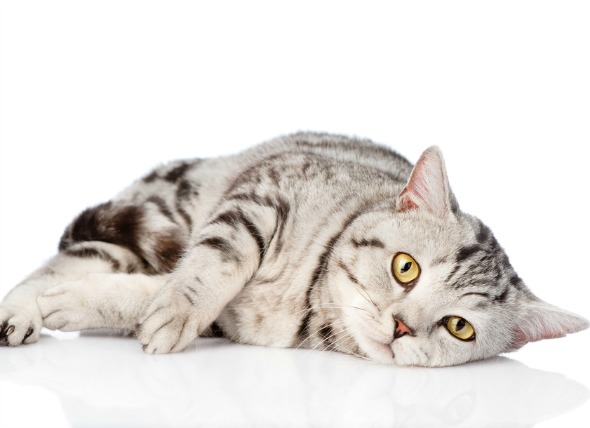
Vomiting is characterized by the expulsion of the contents of the stomach from the body. Meanwhile, chronic cat vomiting is characterized by a long duration or frequent recurrence of vomiting. Gastric and upper gastrointestinal disorders are the main causes of this vomiting.
A secondary cause of vomiting is diseases of other organs that result in the accumulation of toxic substances in the blood that stimulate the vomiting center in the cat’s brain.
Serious complications can occur when a cat does not get the nutrition it needs, or when food is inhaled into the respiratory tract, which can lead to coughing and even pneumonia. Chronic vomiting in cats can also damage the esophagus and even lead to ulcers.
Chronic vomiting affects both dogs and cats. If you want to learn more about how this condition affects dogs, you can check out “Chronic vomiting in dogs”.
Chronic vomiting symptoms in cats
Symptoms of vomiting in cats include vomiting, dry heaving and expulsion of partially digested food. Blood in the vomit may indicate more serious symptoms, which may be a sign of an ulcer or cancer. Even if there is no food in the stomach, the cat will continue to vomit, resulting in clear to yellow, frothy vomit.
Reason
The biggest problem with determining the cause of vomiting in cats and developing a treatment plan is that there are so many possibilities. Some possible causes of chronic vomiting include (but are not limited to):
- Ulcers
- Cancer
- gastritis
- Intestinal parasites
- Intestinal infection or inflammation
- Inflammatory bowel disease
- Liver Failure
- Renal Failure
- Pancreatitis
- Pancreatic tumors
- Inner Ear Diseases
- Addison’s disease
- Canine malarial filariasis
- Improving thyroid function
- Ingestion of foreign bodies
- Bladder obstruction or rupture
- Cats with microviruses
- Ketoacidosis (a form of diabetes)
- Uterine infections (more common in cats to middle age)
Diagnosis of chronic vomiting in cats
There are many possibilities for this condition, so determining the cause of chronic vomiting may take some time. You will need to help your veterinarian find out if there is anything about your cat’s background or habits that might explain it.
Your veterinarian will first determine if your cat is vomiting or just regurgitating. Regurgitation can also be a sign of serious illness, but usually for some reason other than causing vomiting.
You will want to pay close attention to your cat’s pattern of vomiting so that you can describe the symptoms in detail and how often he vomits after eating. Your veterinarian will ask you to describe the appearance of the vomit and what your cat looks like when she vomits.
If your cat is vomiting, it is probably vomiting. The food in the vomit is partially digested and takes on a liquid form. There will usually be a yellow liquid called bile, as well as expelled stomach contents.
If the cat regurgitates, it will lower its head and the food will be expelled effortlessly. The food is undigested and may be tubular, usually solid, and covered with mucus.
Your cat may try to eat regurgitated food. When you take your cat to the vet, they can examine these materials to see what’s in them.
Your veterinarian needs to be aware of your cat’s activities, habits and surroundings, as well as any medications your pet may be taking. Factors that are important and must be followed up on immediately are, for example, when the vomit contains black particles that may look like coffee grounds. These particles indicate that there is blood in the vomit. Fresh blood in vomit is often indicative of stomach ulcers or cancer.
Your veterinarian may recommend blood tests and urinalysis as part of your cat’s diagnosis. These tests help narrow down the potential causes of your cat’s vomiting. X-rays and abdominal ultrasound may be needed to diagnose the cause of your cat’s vomiting and to select the correct treatment.
Treatment of chronic vomiting in cats
Treatment depends on the underlying cause of the vomiting. Treatment recommended by veterinarians includes:
- Change in diet structure
- Prescription pet medications to control vomiting
- Veterinarians prescribe antibiotics
- Glucocorticoids
- Surgery
Life and Management
Always follow the treatment plan recommended by your veterinarian and attend follow-up appointments as recommended to monitor treatment. Do not try medications or food. Keep a close eye on your cat and if it does not improve, return to your veterinarian for a follow-up evaluation.

